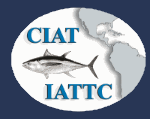Funded
Click to see projects by theme, goal or target:
- Objectives
- Develop a comprehensive database of best-available biological and fisheries data to provide key parameters for Ecological Risk Assessment (ERA) and ecosystem models
- Background
- The Antigua Convention requires the IATTC to ensure the sustainability of target, associated, and dependent species affected by EPO tuna fisheries, and the ecosystem to which they belong.
- ERA and ecosystem models, used by IATTC staff to assess the ecological impacts of tuna fisheries in the EPO, require information on biological, physiological and trophodynamic characteristics of thousands of species in the EPO ecosystem.
- A database with the most up-to-date information for impacted species is required to expedite the initial parameterization, or updating, of future models.
- Relevance for management
- The database will contain data needed for ERAs and ecosystem models, used to identify and prioritize data collection, mitigation, and/or management measures for vulnerable species.
- The databases could be shared with scientists of CPCs.
- Duration
- 72 months
- Workplan and status
- Biological and ecological literature searches for species that have been documented to interact with EPO tuna fisheries
- Identify fishery-related susceptibility parameters for bycatch species
- Update length-weight relationships and average weight by species to facilitate various staff activities and reporting (e.g., Fishery Status Report).
- External collaborators
- Scientists from CPCs interested in contributing to and/or using the databases
- Deliverables
- Comprehensive life history and susceptibility database with fishery-specific information that can be shared with IATTC CPCs for those wishing to develop ERAs for a particular region and/or fishery.
- Updated date: 01 Mar 2024
- Progress summary for the reporting period
- A preliminary life-history database has been developed for all species reported to have interacted with industrial purse-seine, and longline fisheries as well as the predominant small-scale coastal longline and gillnet fisheries.
- Values for fisheries-related susceptibility parameters have been obtained for about 50 of the 110 bycatch species that interact with EPO tuna fisheries. Since the initial development of the database in 2018, a significant update for 32 shark species was undertaken in 2022 for the first EASI-Fish assessment for sharks in the EPO, and a further update was undertaken for silky and three species of hammerhead sharks for a focused EASI-Fish assessment examining potential CMMs.
- A similar initiative has been developed by the SPC and discussions are underway to develop a Pacificwide life-history database.
- New task: update length-weight relationships and average weight of bycatch species to improve various staff activities and reporting (e.g., Fishery Status Report).
- Challenges and key lessons learnt
- The main challenge is sourcing datasets for rare/infrequently caught bycatch species with sufficient sample sizes across a wide size spectrum
- Height manuscripts that use these life-history and susceptibility data have been prepared for submission to scientific journals or IATTC presentations:
- Griffiths, S.P., Siu, S., Hutchinson, M., Lopez, J., Aires-da-Silva, A. 2023. Vulnerability assessment and simulation of potential conservation and management measures for silky and hammerhead sharks caught in eastern Pacific Ocean pelagic fisheries. 14th Meeting of the Scientific Advisory Committee of the IATTC, 15-19 May 2023, La Jolla, California, USA. Document SAC-14-12.
- Griffiths, S.P., Fuller, L.M., Potts, J., Nicol, S. 2022. Vulnerability assessment of sharks caught in eastern Pacific Ocean pelagic fisheries using the EASI-Fish approach. 13th Meeting of the Scientific Advisory Committee of the IATTC, 16-20 May 2022, La Jolla, California, USA. Document SAC-13-11.
- Griffiths, S.P. and Lezama-Ochoa, N. 2021. A 40-year chronology of spinetail devil ray (Mobula mobular) vulnerability to eastern Pacific tuna fisheries and options for future conservation and management. Aquatic Conservation: Marine and Freshwater Ecosystems 31.
- Griffiths, S.P., Kesner-Reyes, K., Garilao, C., Duffy, L.M., Román, M.H., 2018. Development of a flexible ecological risk assessment (ERA) approach for quantifying the cumulative impacts of fisheries on bycatch species in the eastern Pacific Ocean. 9th Meeting of the Scientific Advisory Committee of the IATTC, 14-18 May 2018, La Jolla, California, USA. Document SAC-09-12.
- Griffiths, S.P., Lezama-Ochoa, N., Román, M.H., 2019. Moving towards quantitative ecological risk assessment for data-limited tuna fishery bycatch: application of “EASI-Fish” to the spinetail devil ray (Mobula mobular) in the eastern Pacific Ocean. 9th Meeting of the IATTC Working Group on Bycatch, 11 May 2019, San Diego, California, USA. Document BYC-09-01.
- Griffiths, S.P., Kesner-Reyes, K., Garilao, C., Duffy, L.M., Román, M.H., 2019. Ecological Assessment of the Sustainable Impacts of Fisheries (EASI-Fish): a flexible vulnerability assessment approach to quantify the cumulative impacts of fishing in data-limited settings. Marine Ecology Progress Series 625, 89-113.
- Griffiths, S.P., Wallace, B., Swimmer, Y., Alfaro-Shigueto, J., Mangel, J.C., Oliveros-Ramos, R., 2020. Vulnerability status and efficacy of potential conservation measures for the east Pacific leatherback turtle (Dermochelys coriacea) stock using the EASI-Fish approach. 10th Meeting of the IATTC Working Group on Bycatch, 10 September 2020, La Jolla, California, USA. Document BYC-10-01.
- Griffiths, S.P., Fuller, L.M., Potts, J., Nicol, S., 2022. Vulnerability assessment of sharks caught in eastern Pacific Ocean pelagic fisheries using the EASI-Fish approach. 13th Meeting of the Scientific Advisory Committee of the IATTC, 16-20 May 2022, La Jolla, California, USA. Document SAC-13-11, 80.

